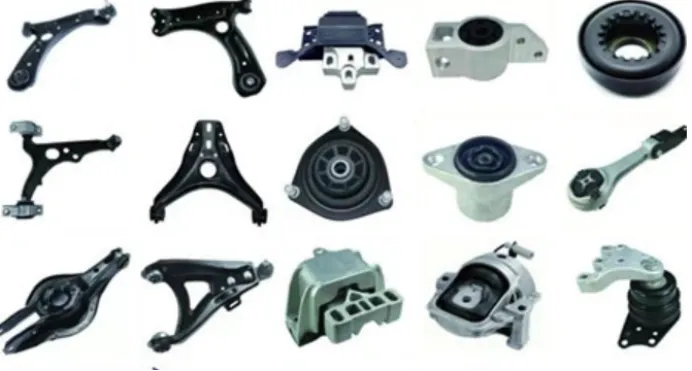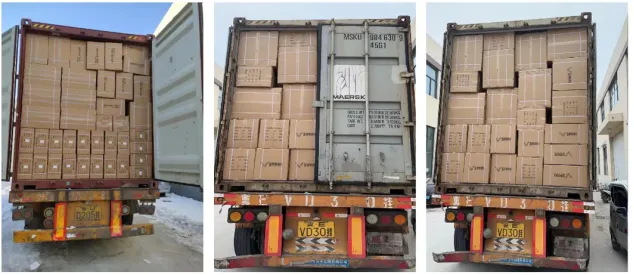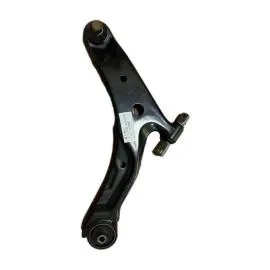The control arm, also known as an A-arm or wishbone, is a crucial component in modern automobiles that plays a vital role in the vehicle's suspension system. The main function of the control arm is to connect the wheel hub and steering knuckle to the chassis of the vehicle, allowing for smooth and controlled movement of the wheels.
The production process of a control arm involves several steps. First, the design of the control arm is created using computer-aided design (CAD) software, which allows for precise measurements and specifications. Next, the control arm is typically manufactured using high-strength steel or aluminum alloy, which are both durable and lightweight materials. The control arm is then forged, machined, and welded together to create a strong and reliable component.
Once the control arm is produced, it is installed in the vehicle's suspension system, where it plays a crucial role in maintaining control and stability. The control arm helps to absorb shocks and vibrations from the road, ensuring a smooth and comfortable ride for the driver and passengers. Additionally, the control arm helps to keep the wheels aligned and in proper contact with the road surface, improving handling and overall performance.
Overall, the use of modern control arms in automobiles has greatly improved the safety, comfort, and performance of vehicles on the road. By connecting the wheels to the chassis and supporting the suspension system, control arms play a key role in ensuring that vehicles can handle various road conditions with ease. Thanks to advancements in materials and manufacturing processes, control arms are now more durable and reliable than ever, making them an essential component in the modern automotive industry.
|
Eru |
Idadoro Isalẹ Iṣakoso Arm Fun Hyundai Santa Fe 54501-26000 |
|
OEM nọmba |
54501-26000 |
|
Ohun elo |
Irin |
|
Àwọ̀ |
Afihan/adani |
|
Ibi ti Oti |
Orile-ede China |
|
Iṣẹ |
OEM & ODM |
|
MOQ |
100 PCS |
|
Agbara Ipese |
100000/Osu |
|
Akoko Isanwo |
T/T, L/C |
|
Akoko Ifijiṣẹ |
Awọn ọjọ 25-35 Lẹhin ti Ibere ti jẹri |
|
Iṣowo Akoko |
FOB, CIF, CFR, EXW ati bẹbẹ lọ |
|
Iṣakojọpọ |
1.Plastic apo + Carton; |


1.Matching pẹlu awọn iwọn ti awọn atilẹba ti nše ọkọ, Original fifi sori.
2.Imudara subversion ati imukuro ariwo.
3.Ailewu, Ti o wa titi, Iduroṣinṣin, Ti o tọ, Idaniloju Didara.
4.Iwakọ ati iduroṣinṣin gigun.
5.Reduce ajeji ronu ati ki o gun ga otutu resistance aye.
6.Pari awọn iru ọkọ.
7.Excellent workmanship: apakan kọọkan ni a ṣe ni pẹkipẹki lati rii daju pe iṣẹ ti o dara julọ.
8.Exquisite dada itọju ati pipe alurinmorin: Welding ojuami ni o wa ani ati ki o kun, First-kilasi irin, boṣewa sisanra. Pẹlu awọn ohun elo ti o to, nipọn, abuku ati sooro fifọ.
9.Awọn didara ti ọkọ ayọkẹlẹ atilẹba jẹ igbẹkẹle.


- Q: Kini awọn ofin iṣakojọpọ rẹ?
- A: A ni ọpọlọpọ awọn iru package, nitorinaa apẹrẹ tirẹ yoo gba, a le ṣe aṣa package fun ọ
- Q: Kini awọn ofin isanwo rẹ?
- A: T / T 30% bi idogo, ati 70% ṣaaju ifijiṣẹ. A yoo fi awọn fọto ti awọn ọja ati awọn idii han ọ ṣaaju ki o to san iwọntunwọnsi.
- Q: Bawo ni nipa akoko ifijiṣẹ rẹ?
- A: Ni gbogbogbo o jẹ awọn ọjọ 5-10 ti awọn ọja ba wa ni iṣura. tabi o jẹ 15-20 ọjọ ti awọn ọja ko ba si ni iṣura, o jẹ gẹgẹ bi opoiye.
- Q: Ṣe o le gbejade ni ibamu si awọn ayẹwo?
- A: Bẹẹni, a le gbejade nipasẹ awọn ayẹwo rẹ tabi awọn iyaworan imọ-ẹrọ. A le kọ awọn molds ati amuse.
- Q: Ṣe o pese awọn apẹẹrẹ? o jẹ ọfẹ tabi afikun?
- A: Bẹẹni, a le funni ni ayẹwo fun idiyele ọfẹ ṣugbọn ko san idiyele ti ẹru.
- Q: kini MOQ fun awọn nkan kọọkan?
- A: Ti awọn nkan ti a ba ni iṣura, ko si aropin fun MOQ, ati deede MOQ bi awọn ege 100 jẹ itẹwọgba.
- Q: Bawo ni o ṣe ṣe iṣeduro didara naa?
- A: Ṣaaju ifijiṣẹ, a yoo ṣe idanwo awọn ọja lati rii daju pe wọn wa ni ipo ti o dara. A ni akoko atilẹyin ọja 12-osu. Ti o ba ni iriri awọn iṣoro didara, a yoo ṣe iṣeduro rirọpo tabi pada laarin akoko atilẹyin ọja.
- Q: Bawo ni o ṣe jẹ ki iṣowo wa fun igba pipẹ ati ibatan to dara?
- A:We keep good quality and competitive price to ensure our customers benefit ; We respect every customer as our friend and we sincerely do business and make friends with them, no matter where they come from
















































































































